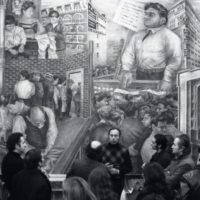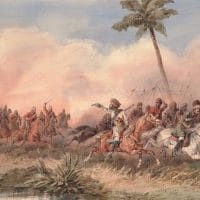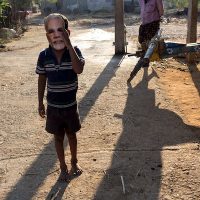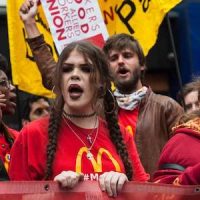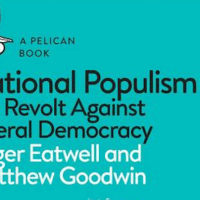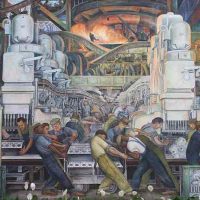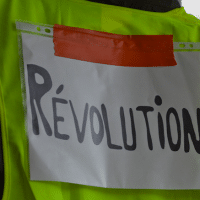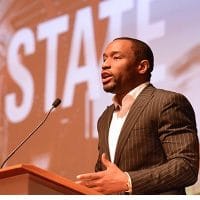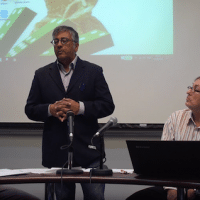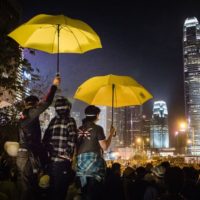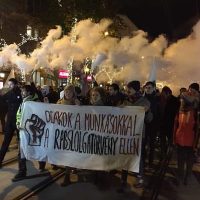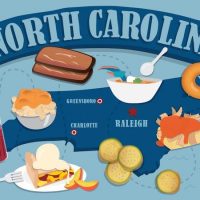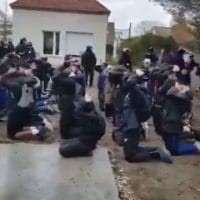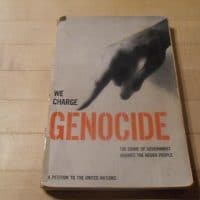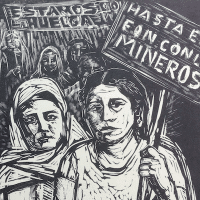-
Direct Job Creation in America with Steven Attewell
In this episode, we’re joined by Steven Attewell, Adjunct Professor of Public Policy at the City University of New York’s School of Labor and Urban Studies.
-
Are we at a tipping point?
“Liberal democracy is crumbling.” A Harvard Law Professor opened a recent talk with this matter-of-fact statement and the audience readily murmured its assent.
-
The roots of Karl Marx’s anti-Colonialism
Through his relationship with the Chartist radical and labor poet Ernest Jones, Karl Marx came to realize the necessity of opposing slavery and colonialism in ending capitalism.
-
Dossier 12: India’s Communists and the elections of 2019
Ahead of the 2019 elections in India—the largest exercise of electoral democracy in the world–Brinda Karat of the Communist Party of India (Marxist) discusses the current political context in the country and the left-led resistance to the deepening assault on basic human rights led by India’s right-wing.
-
How the U.S. spent Billions to change the outcome of elections around the World
The U.S. military state overthrows democratically-elected governments that it deems to be a threat to corporate interests.
-
The political roots of falling wage growth
It’s now official: workers around the world are falling behind. The International Labor Organization’s (ILO) latest Global Wage Report finds that, excluding China, real (inflation-adjusted) wages grew at an annual rate of just 1.1% in 2017, down from 1.8% in 2016. That is the slowest pace since 2008.
-
Liberals, the populist right & the politics of imperialism
How to respond to the rise of national populism? The phenomenon is evident not only in Trump’s U.S. but throughout Europe, as shown in this book’s comprehensive review of changes in mass opinion. The book also attempts to provide a solution to the problem, one that will defend democracy, but in doing so it inadvertently highlights the bankruptcy of the liberal outlook.
-
Exploitation, Marxism, and Labour Law (Part Two)
The first model is a radical critique of all forms of bourgeois right, including employment rights, which are considered to constitute an ideological reflection of the capitalist mode of production, and therefore an inseparable companion of exploitation.
-
Exploitation, Marxism, and Labour Law (Part One)
On trial with other members of the Rhenish District Committee of Democrats in 1849, Karl Marx argued in a Cologne court that their prosecution was based upon “laws which the Crown itself has trampled into the dirt”.
-
Yellow vest movement is not just about fuel tax hike, it is a crystallization of a deep social discontent and distress
Since November 17, France has been witnessing the massive Gilets jaunes or ‘Yellow Vests’ protests against the anti-working class policies of the Emmanuel Macron government. The protests against the rising economic burden on the people are also spreading to many other European countries.
-
We want cash while waiting for Communism
Susan Ram, who is writing a book on the French Left for LeftWord Books (New Delhi), has a crisp assessment of the yellow vest (gilets jaunes) movement and of its fifth week of demonstration–Act V Macron Démission (Macron Resign). It is anger and determination that defines the yellow vest protest.
-
“A free Palestine from the river to the sea”
It is not uncommon for a mainstream media commentator to be fired for a bigoted or violent comment on air-or off air. As far as I know, there was never a person specifically fired for advocating non-violence and the equal treatment of a group of people.
-
Plan Oder Markt: the battle of ideas between Austro-Marxism and neoliberalism in Vienna
Co-sponsored by SFU’s Institute for the Humanities, School for International Studies, Department of History, & Department of Sociology and Anthropology.
-
Money & Power with Jamee Moudud
In this episode, we’re joined by Jamee Moudud, a professor of economics at Sarah Lawrence College, Jamee draws on the tradition of critical legal studies to extend the constitutional theory of money to new historical and international contexts.
-
Hungarians hit the street against ‘slave law’ that increases overtime
According to the new provision that was passed on Wednesday, employers can demand as much as 400 hours of overtime a year and can take three years to disburse the payments for the same.
-
Why are people hungry in North Carolina?
Tina Tru explains the facts about hunger in North Carolina—and looks at the kinds of policies, both local and system-wide, that could make a difference.
-
Cops in France brutalize high school students who join Yellow Vest protests
A scene of ordinary life in France, in these times of conflict: On Thursday, Dec. 6, late morning, in front of the gates of a secondary school in a very peaceful town in the Paris suburbs, about 100 students aged 15-17 are strolling from their high school to go to lunch, chatting, joking and relieved that the half-day classes are over.
-
‘Slave Bible’ converted slaves to Christianity by omitting parts that could lead to uprising
A new exhibit at a Washington, D.C., museum featuring an abridged version of the Bible sheds light on how Christian missionaries converted enslaved Africans to Christianity by teaching them the Gospel…except the parts about freedom, equality and resistance.
-
Marc Lamont Hill and the Legacy of Punishing Black Internationalists
Hill’s bold statement to the UN is part of the internationalist Black radical tradition, exemplified by Paul Robeson, the Black Panther Party, and today’s Black Lives Matter movement.
-
This economic policy has been a disaster, a calamity for the country’s public life
As AMLO begins his presidential term in Mexico, he has been confronted by years of neoliberal policies, policies crafted by institutions like the IMF and the World Bank, who praised the selling off of Mexico’s assets as a model. When protestors contest this agenda—as they recently did at the G20 meeting in Buenos Aires—, the reply from leaders comes written in tear gas. Meanwhile, tens of thousands of farmers and thousands more of those who stood with them marched across Delhi to demand a parliamentary session to address the agrarian crisis.

